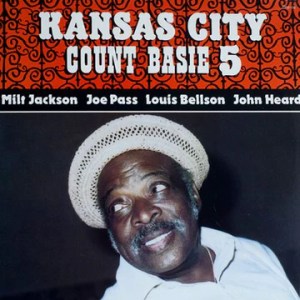- Presenting yet another amazingly well recorded Count Basie album, with STUNNING Triple Plus (A+++) sound throughout
- It’s bigger, richer, more Tubey Magical, with more extension on both ends of the spectrum than every other other copy we played
- A different sound for Basie, a small group setting with two of his favorite players at his side: Milt Jackson on vibes and Joe Pass on guitar
- “The predictably excellent group performs spirited versions of some of Basie’s “hits” (including “Jive at Five” and “One O’Clock Jump”), some blues and a few standards. It is always interesting to hear Basie in a hornless setting like this one where he gets opportunities to stretch out on the piano.”
Only recently did I become familiar with this record, released in 1981 from sessions recorded in 1977. We pick up all the Pablo Basie titles we can get our hands on these days. When we dropped the needle on a copy of the album we were amazed at the sound. Don’t know much about the engineer — Geoff Sykes — but he did a great job working at Kendun for this session.
This was the first of a series of smaller ensemble recordings under the heading of Kansas City. We have more coming, including the superb Kansas City piano trio album entitled “For the Second Time” with Louis Bellson and Ray Brown, a record that can have superb sound on the Pablo pressing (but steer clear of the OJC which is thin and opaque, the opposite of the sound you want).
With such a small group and no horn players there is much more room for interplay between Basie and either Pass or Jackson. As the liner notes make clear, both vets quickly adapted their playing styles to the laidback Count Basie approach to the blues. If you are in the market for some smooth Basie grooves with exceptionally good sound, this one should be right up your alley.
What Shootout Winning sides such as these have to offer is not hard to hear:
- The biggest, most immediate staging in the largest acoustic space
- The most Tubey Magic, without which you have almost nothing. CDs give you clean and clear. Only the best vintage vinyl pressings offer the kind of Tubey Magic that was on the tapes in 1977
- Tight, note-like, rich, full-bodied bass, with the correct amount of weight down low
- Natural tonality in the midrange — with all the instruments having the correct timbre
- Transparency and resolution, critical to hearing into the three-dimensional studio space
No doubt there’s more but we hope that should do for now. Playing the record is the only way to hear all of the qualities we discuss above, and playing the best pressings against a pile of other copies under rigorously controlled conditions is the only way to find a pressing that sounds as good as this one does.
The Players
Bass – John Heard
Drums – Louis Bellson
Guitar – Joe Pass
Piano – Count Basie
Vibraphone – Milt Jackson
Producer, Artwork By – Norman Granz
What We’re Listening For on Kansas City 5
- Energy for starters. What could be more important than the life of the music?
- Then: immediacy. The instruments aren’t “back there” somewhere, lost in the fog. They’re front and center where any recording engineer worth his salt would put them.
- The Big Sound comes next — wall to wall, lots of depth, huge space, three-dimensionality, all that sort of thing.
- Then transient information — fast, clear, sharp attacks, not the smear and thickness so common to these LPs.
- Tight punchy bass — which ties in with good transient information, also the issue of frequency extension further down.
- Next: transparency — the quality that allows you to hear deep into the soundfield, showing you the space and air around all the instruments.
- Extend the top and bottom and voila, you have The Real Thing — an honest to goodness Hot Stamper.
TRACK LISTING
Side One
Jive At Five
One O’ Clock Jump
(We Ain’t Got) No Special Thing
Memories Of You
Frog’s Blues
Side Two
Rabbit
Perdido
Timekeeper
Mean To Me
Blues For Joe Turner
AMG Review
This studio session from 1977 features Count Basie in a quintet with vibraphonist Milt Jackson and guitarist Joe Pass. The predictably excellent group performs spirited versions of some of Basie’s “hits” (including “Jive at Five” and “One O’Clock Jump”), some blues and a few standards. It is always interesting to hear Basie in a hornless setting like this one where he gets opportunities to stretch out on the piano.
